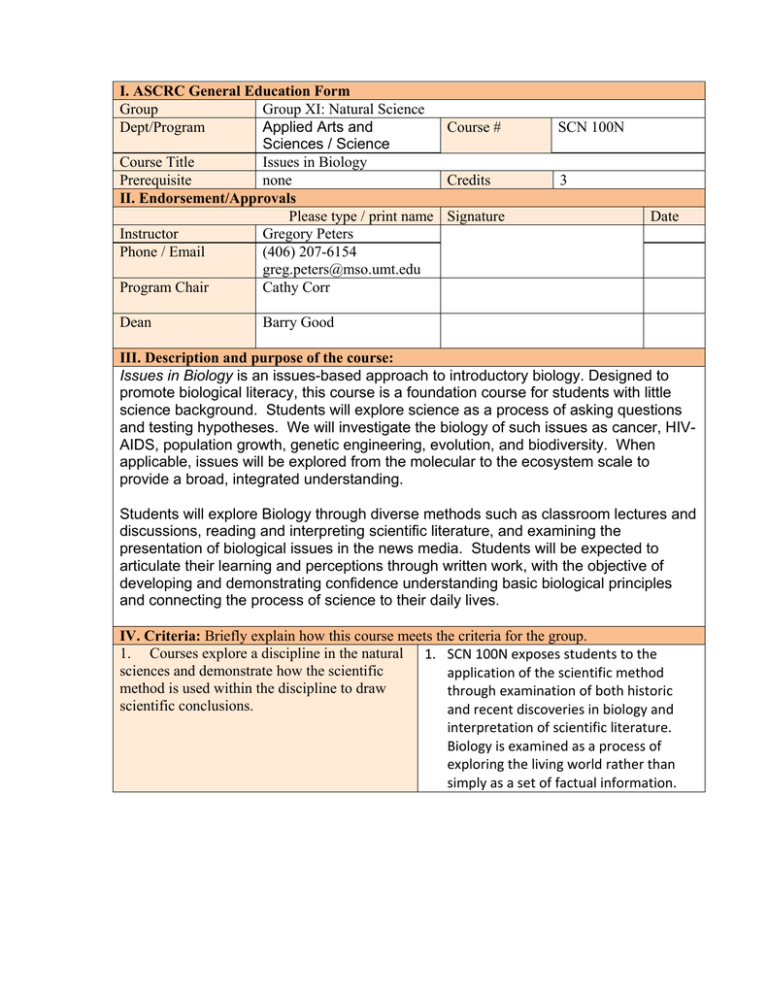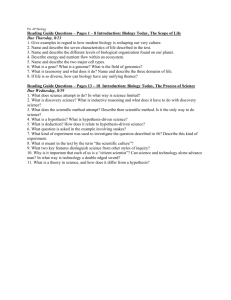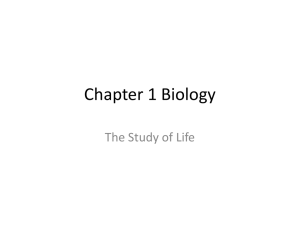I. ASCRC General Education Form Group Group XI: Natural Science Dept/Program
advertisement

I. ASCRC General Education Form Group Group XI: Natural Science Dept/Program Course # Applied Arts and Sciences / Science Course Title Issues in Biology Prerequisite none Credits II. Endorsement/Approvals Please type / print name Signature Instructor Gregory Peters Phone / Email (406) 207-6154 greg.peters@mso.umt.edu Program Chair Cathy Corr Dean SCN 100N 3 Date Barry Good III. Description and purpose of the course: Issues in Biology is an issues-based approach to introductory biology. Designed to promote biological literacy, this course is a foundation course for students with little science background. Students will explore science as a process of asking questions and testing hypotheses. We will investigate the biology of such issues as cancer, HIVAIDS, population growth, genetic engineering, evolution, and biodiversity. When applicable, issues will be explored from the molecular to the ecosystem scale to provide a broad, integrated understanding. Students will explore Biology through diverse methods such as classroom lectures and discussions, reading and interpreting scientific literature, and examining the presentation of biological issues in the news media. Students will be expected to articulate their learning and perceptions through written work, with the objective of developing and demonstrating confidence understanding basic biological principles and connecting the process of science to their daily lives. IV. Criteria: Briefly explain how this course meets the criteria for the group. 1. Courses explore a discipline in the natural 1. SCN 100N exposes students to the sciences and demonstrate how the scientific application of the scientific method method is used within the discipline to draw through examination of both historic scientific conclusions. and recent discoveries in biology and interpretation of scientific literature. Biology is examined as a process of exploring the living world rather than simply as a set of factual information. 2. SCN 100N explicitly explores the methods of asking questions, developing valid hypotheses, and scientific hypothesis testing. SCN 100N furthermore explores the relationship between this process and the development of rigorously tested scientific theories. Numerous concepts are connected to the core, unifying biological theories of the cellular basis for life and evolution. 3. Lab courses engage students in inquiry3. SCN 100N does not have a laboratory based learning activities where they formulate a component, but asks students to hypothesis, design an experiment to test the demonstrate the ability to develop valid hypothesis, and collect, interpret, and present scientific hypotheses and interpret the the data to support their conclusions. conclusions drawn from the scientific process in the analysis of current scientific literature. V. Student Learning Goals: Briefly explain how this course will meet the applicable learning goals. Upon completion of this perspective, a student Upon completion of this course, students will will be able to: be able to: 1. understand the general principles 1. Understand and apply the core principles associated with the discipline(s) studied. of Biology, including: ‐ The cellular basis of life ‐ The theory of evolution ‐ The flow of energy in living systems ‐ The core principles of genetics and heredity ‐ The nature of interactions between living systems (principles of ecology) ‐ Biodiversity and the impacts of humans on living systems 2. understand the methodology and activities 2. Understand the methods biologists use to scientists use to gather, validate and interpret develop and explore questions, through: data related to natural processes. ‐ Discussing the efficacy and limits of the scientific method of inquiry ‐ Evaluating scientific arguments in both classroom material and scientific literature ‐ Examining historic and current examples of biologists’ work 2. Courses address the concept of analytic uncertainty and the rigorous process required to take an idea to a hypothesis and then to a validated scientific theory. 3. detect patterns, draw conclusions, develop 3. Observe biological phenomena and conjectures and hypotheses, and test them by practice the skills needed to develop valid appropriate means and experiments. hypotheses and interpret scientific data. Students will not be involved in hands‐on hypothesis testing because SCN 100N does not include a laboratory component. Students will, however, develop skills interpreting data through examination of the scientific process as carried out by working biologists, as well as develop skills researching biological phenomena using scientific literature. 4. understand how scientific laws and 4. Use critical thinking skills to evaluate theories are verified by quantitative scientific conclusions through: measurement, scientific observation, and ‐ Examining the development of major logical/critical reasoning. biological theories in a historical context ‐ Discussing and rejecting alternative hypotheses for biological phenomena ‐ Understanding components of scientific hypothesis testing, including: ‐ control vs. treatment groups ‐ taking valid measurements ‐ replication ‐ statistical analyses 5. understand the means by which analytic uncertainty is quantified and expressed in the natural sciences. 5. Appreciate the ongoing nature of Biological research: Students will understand the methods through which scientists communicate the degree of confidence in their conclusions, including the concept of statistical significance. Students will recognize the quantification of scientific uncertainty through critical examination of the connection between the methodology and results presented in samples of scientific literature. VII. Syllabus: Below is the current syllabus for SCN 100N: SCN100N: Issues in Biology Autumn 2008 Instructor: Greg Peters Contact: greg.peters@mso.umt.edu or (406) 207-6154 Office Hours: Wednesdays 9:00 - 12:00 in HB 11 Text: Minkoff & Baker. 2004. Biology Today: An Issues Approach. Garland Science: NY, NY. Course Description: Issues in Biology is an issues-based approach to introductory biology. Designed to promote biological literacy, this course is a foundation course for health core students with little science background. We will be exploring the biology behind such issues as cancer, HIV-AIDS, population growth, genetic engineering, evolution, and biodiversity. When possible, issues will be explored from the molecular to the ecosystem scale to provide a broad, integrated understanding. Course Objectives: - Identify and evaluate scientific arguments - Understand and apply the scientific method of inquiry; understand its scope and limits - Understand components of scientific hypothesis testing - Understand the methods biologists use to develop and explore questions - Make informed decisions in biology-based issues as a consumer and citizen - Understand fundamental biological concepts, laws, and theories - Understand matter, energy, and organization in biological systems - Identify patterns of interaction in living systems at different scales - Understand the fundamental concepts of genetics and apply them in current issues - Use critical thinking to evaluate scientific arguments and issues in biology - Engage in self-directed research to think critically about biology Assessment: 1) Exams (3) 2) Biological Science Journal Summaries (5) 3) Biology in the news summaries (5) 4) Cumulative Final Exam TOTAL: points 300 50 25 125 500 grades 90-100% = A- to A 80-90% = B- to B+ 70-80% = C- to C+ 60-70% = D- to D+ < 60% = F Some recommendations: The two most important things you can do to get the most out of this course are to keep up with the reading and commit to regular attendance in class. Working through the practice questions in the text is a good idea, because these will keep you thinking about the material and they may be similar to some exam questions. Your NetID will give you access to an online supplement to this course that includes portions of the presentations used in class. Log in at: https://courseware.umt.edu/webapps/login/ You will be expected to work on your own without resources on all exams, so make sure to review your notes and reading thoroughly before exams. Ask questions when something is unclear or maybe just particularly interesting. Course Policies: Late assignments will lose 10% per class meeting, starting immediately after class, so please plan ahead to get them to me at the beginning of class on the due date. Makeup exams will only be offered for compelling reasons and if advance notice is given. No early finals will be offered, so make any travel plans accordingly. Students with disabilities will receive appropriate accommodations. Please contact me and provide a letter from your DSS coordinator so that accommodations can be made. All students need to be familiar with the Student Conduct Code and practice academic honesty. The Code is available for review online at http://www.umt.edu/SA/VPSA/index.cfm?page?1321. University policies on drops, adds, changes of grade option, or change to audit status will be observed in this course. Please note that after October 6th, such changes are NOT automatically approved; they may be requested by petition, but the petition must be accompanied by documentation of extenuating circumstances. Requests to drop a course or change the grade basis to benefit a student’s grade point average will not be approved. A grade of C or higher will be considered a passing grade for the P/NP option. Class Schedule: Date: Aug 25 Aug 27 Topic: Biology: Science and Ethics Classifying nature, Cells Summary Due: Sep 1 Sep 3 No class: Labor Day Holiday Classifying nature, Kingdoms of Life Journal #1 6 (173-194) Sep 8 Sep 10 Principles of genetics Human genetics News #1 2 (34-45, 56-61) 3 (64-71, 79-86) Sep 15 Sep 17 Genetic engineering Genetic engineering Journal #2 4 (96-113) 11 (396-409) Sep 22 Sep 24 Exam 1 Review EXAM 1 Sep 29 Oct 1 Evolution Evolution Oct 6 Oct 8 Sociobiology, Human variation Human variation, Population growth Journal #3 Oct 13 Oct 15 Nutrition and Health Nutrition, Drug use & abuse Oct 20 Oct 22 EXAM 2 Plants and crops Oct 27 Oct 29 Plants and crops Cell division, Development Nov 3 Nov 5 Cancer The nervous system News #4 Nov 10 Nov 12 Mind and Body Intro to Ecology 15 (540-542, 555-558, 564) Journal #5 Nov 17 Nov 19 EXAM 3 Disease Nov 24 Nov 26 Biodiversity No Class: Thanksgiving Holiday 18 (642-647, 655-672 Dec 1 Dec 3 Threats to the biosphere Course wrap-up 19 (700-711) News #2 News #3 Read Chap (pgs): 1 (1-12, 18-24) 6 (160-172) 5 (124-141) 5&6 (142-154, 195-200) 8&7 (246-261, 204-20 7&9 (217-220, 282-29 10 (326-356) 14 (502-511, 521-526) 11 (366-377) Journal # 4 11 (378-387) 12 (416-419, 423-431) 12 (432-451) 13 (464-487) 16&17: (612-617, 574-576, 582- News #5




